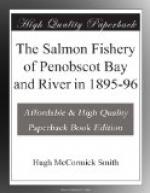[Footnote 4: The parts referred to in the key may be defined as follows: Anal fin, the single fin on the median line of the body, between the vent and the tail; gillrakers, bony protuberances on the concave side of the bones supporting the gills; branchiostegals, small bones supporting the lower margin of the gill cover; pyloric coeca, worm-like appendages of the lower end of the stomach; vomer, a bone in the front part of the roof of the mouth.]
I. Anal fin elongate, with 16 rays; gillrakers 9 +
14; branchiostegals
15 to 19; pyloric coeca 140
to 180; caudal fin considerably
forked; average weight about
20 pounds, maximum 100 pounds.
Quinnat salmon.
[Illustration:
Chinook or quinnat salmon (Oncorhynchus
tschawytscha)]
II. Anal fin short, with 9 to 12 rays; gillrakers
8 + 12:
branchiostegals 11; pyloric
coeca less than 70.
1. Teeth on vomer little developed,
those on shaft few and
deciduous; scales
large, about 120 in lateral series;
pyloric coeca
65; caudal fin emarginate; average weight
15 pounds, maximum
40 pounds.
Atlantic salmon.
[Illustration: Atlantic salmon (Salmo salar)]
2. Teeth on vomer well developed,
those on shaft of bone
numerous and persistent
in a zigzag row or two alternating
series; scales
about 150 (130 to 180) in lateral series;
pyloric coeca
42; caudal fin squarely emarginate; average
weight 10 pounds,
maximum 20 pounds.
Steelhead trout.
[Illustration: Steelhead trout (Salmo gairdneri)]
[Illustration:
Map showing the location of the salmon
weirs and traps
fished in Penobscot River and Bay in
1896]
***End of the project gutenberg EBOOK the salmon fishery of Penobscot bay and river in 1895-96***
******* This file should be named 17039.txt or 17039.zip *******
This and all associated files of various formats will be found in: http://www.gutenberg.org/dirs/1/7/0/3/17039
Updated editions will replace the previous one—the old editions will be renamed.
Creating the works from public domain print editions means that no one owns a United States copyright in these works, so the Foundation (and you!) can copy and distribute it in the United States without permission and without paying copyright royalties. Special rules, set forth in the General Terms of Use part of this license, apply to copying and distributing Project Gutenberg-tm electronic works to protect the project gutenberg-tm concept and trademark. Project Gutenberg is a registered trademark, and may not be used if you charge for the eBooks, unless




